Atrial repolarization - Study guides, Class notes & Summaries
Looking for the best study guides, study notes and summaries about Atrial repolarization? On this page you'll find 1735 study documents about Atrial repolarization.
Page 4 out of 1.735 results
Sort by
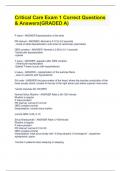
-
Critical Care Exam 1 Correct Questions & Answers(GRADED A)
- Exam (elaborations) • 19 pages • 2024
-
Available in package deal
-
- $13.99
- + learn more
P wave - ANSWER Depolarization of the atria PR interval - ANSWER -Normal is 0.12 to 0.2 seconds - onset of atrial depolarization until onset of ventricular polarization QRS complex - ANSWER -Normal is 0.06 to 0.11 seconds -Ventricular depolarization -systole T wave - ANSWER -appears after QRS complex - Ventricular repolarization -Spiked T-wave occurs with hyperkalemia U wave - ANSWER - repolarization of the purkinje fibers - seen in patients with hypokalemia SA node - ANSWER...
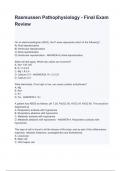
-
Rasmussen Pathophysiology - Final Exam Review questions and answers
- Exam (elaborations) • 45 pages • 2024
-
Available in package deal
-
- $7.99
- + learn more
On an electrocardiogram (EKG), the P wave represents which of the following? A) Atrial depolarization B) Ventricular depolarization C) Atrial repolarization D) Ventricular repolarization - ANSWER-A) Atrial depolarization Select all that apply. Which lab values are incorrect? A. Na+ 135-145 B. K+ 2.3-2.9 C. Mg 1.8-2.4 D. Calcium 2-3 - ANSWER-B. K+ 2.3-2.9 D. Calcium 2-3 What electrolyte, if too high or low, can cause cardiac arrhythmias? A. Mg B. Na+ C. K+ D. Ca - ANSWER-C. K+ A p...
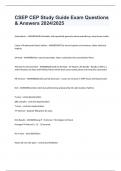
-
CSEP CEP Study Guide Exam Questions & Answers 2024/2025
- Exam (elaborations) • 74 pages • 2024
-
Available in package deal
-
- $12.99
- + learn more
CSEP CEP Study Guide Exam Questions & Answers 2024/2025 Autorythmic - ANSWERSSelf Exciteable, and repeatedly generate action potential eg. natural pace maker Cause of fundamental heart rhythm - ANSWERSNOT by nerve impulses or hormones, rather electrical impluse SA Node - ANSWERSMain natural pacemaker, faster conduction than autorhytmic fibres The Heart's electrical flow - ANSWERSSA Node to AV Node - AV Node to AV Bundle - Bundle of HIS to L and R branches to Apex and Purkinje FIbr...
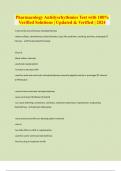
-
Pharmacology Antidysrhythmics Test with 100% Verified Solutions | Updated & Verified | 2024
- Exam (elaborations) • 15 pages • 2024
-
- $9.99
- + learn more
-treats atrial and ventricular tachydysrhyhmias -adverse effects: dysrhythmias, blood disorders, lupus like syndrome, vomiting, diarrhea, prolonged QT interval, - Procainamide (Pronestyl) -Class Ib -block sodium channels -accelerate repolarization -increase or decrease APD -used for atrial and ventricular tachydysrhythmias caused by digitalis toxicity or prolonged QT interval - Phenytoin -used to treat ventricular tachydysrhythmias -raises ventricular fibrillation threshold -can cause...
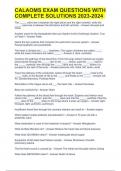
-
CALAOMS FINAL EXAM QUESTIONS AND ANSWERS LATEST UPDATE 2023-2024
- Exam (elaborations) • 19 pages • 2023
-
- $14.99
- 1x sold
- + learn more
CALAOMS FINAL EXAM QUESTIONS AND ANSWERS LATEST UPDATE 2023-2024. Name the two systems that comprise the autonomic nervous system: - Answer Parasympathetic and sympathetic The heart is divided into _____ chambers. The upper chambers are called _____ while the lower chambers are called _____. - Answer 4, atria, ventricles Continue the pathway of the blood flow: From the lungs where it picked up oxygen, blood travels through the _____ vein to the _____ atrium, past the _____ valve to the ___...
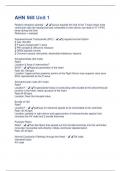
-
AHN 568 Unit 1 Questions and Answers 100% Pass
- Exam (elaborations) • 15 pages • 2024
- Available in package deal
-
- $8.39
- + learn more
Relative refractory periods - ️️occurs towards the end of the T-wave when most ventricular cells are repolarized and vulnerable to new stimuli; can lead to VT if PVC lands during this time Refractory = resistant Supraventricular Tachycardia (SVT) - ️️§ regular but fast rhythm § rate 150-250 § P wave merged with T wave § PRI variable & difficult to measure § QRSà typically narrow § Common causes: stimulants, electrolyte imbalance, hypoxia Sinoatrial Node (SA node) Rate? ...
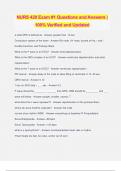
-
NURS 420 Exam #1 Questions and Answers | 100% Verified and Updated
- Exam (elaborations) • 117 pages • 2024
- Available in package deal
-
- $15.49
- + learn more
NURS 420 Exam #1 Questions and Answers | 100% Verified and Updated a wide QRS is defined as - Answer-greater than .12 sec Conduction system of the heart - Answer-SA node, AV node, bundle of His, r and l bundle branches, and Purkinje fibers What is the P wave of an ECG? - Answer-atrial depolarization What is the QRS complex of an ECG? - Answer-ventricular depolarization and atrial repolarization What is the T wave of an ECG? - Answer-ventricular repolarization PR interval - Answer-delay ...
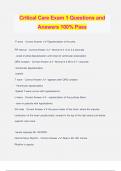
-
Critical Care Exam 1 Questions and Answers 100% Pass
- Exam (elaborations) • 34 pages • 2024
- Available in package deal
-
- $13.49
- + learn more
Critical Care Exam 1 Questions and Answers 100% Pass P wave - Correct Answer ️️ -Depolarization of the atria PR interval - Correct Answer ️️ --Normal is 0.12 to 0.2 seconds - onset of atrial depolarization until onset of ventricular polarization QRS complex - Correct Answer ️️ --Normal is 0.06 to 0.11 seconds -Ventricular depolarization -systole T wave - Correct Answer ️️ --appears after QRS complex - Ventricular repolarization -Spiked T-wave occurs with hyperkalemia U...
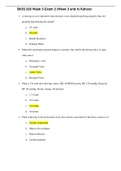
-
BIOS 255 Week 5 Exam 2 (Week 3 and 4) Kahoot (GRADED A) Questions and Answers.
- Exam (elaborations) • 10 pages • 2022
-
Available in package deal
-
- $10.99
- 2x sold
- + learn more
1. A missing p-wave indicated what structure is not depolarizing/firing properly thus not properly depolarizing the atrium? a. AV node b. SA node c. Bundle Branches d. Perkinje Fibers 2. When left ventricular pressure begins to increase, this will be the driving force to open what valve? a. Pulmonary valve b. Tricuspid Valve c. Aortic Valve d. Bicuspid Valve 3. What is CO with the following values: HR: 60 BPM Systolic BP: 120 mmHg, Diastolic: BP: 80 mmHg, Stroke volume: 60 mL/beat a. 1.5 L/min b...
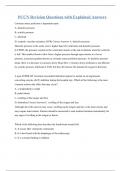
-
PCCN Revision Questions with Explained Answers
- Exam (elaborations) • 43 pages • 2024 Popular
-
- $11.49
- 2x sold
- + learn more
Coronary artery perfusion is dependent upon: A. diastolic pressure B. systolic pressure C. afterload D. systemic vascular resistance (SVR) Correct Answers A. diastolic pressure Diastolic pressure in the aortic root is higher than left ventricular end-diastolic pressure (LVEDP), the pressure exerted on the ventricular muscle at the end of diastole when the ventricle is full. This enables blood to flow from a higher pressure through open arteries to a lower pressure, a pressure gradient known...

Did you know that on average a seller on Stuvia earns $82 per month selling study resources? Hmm, hint, hint. Discover all about earning on Stuvia


